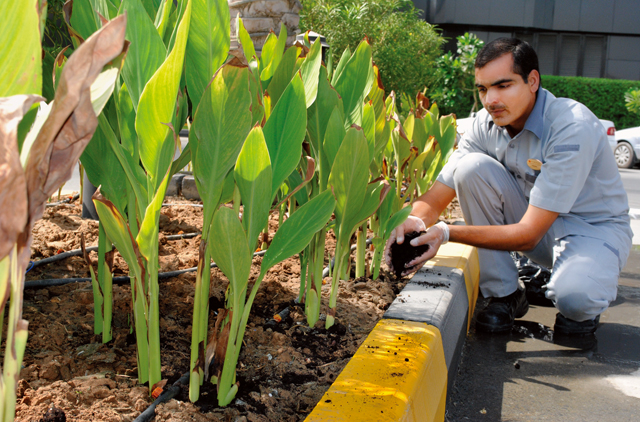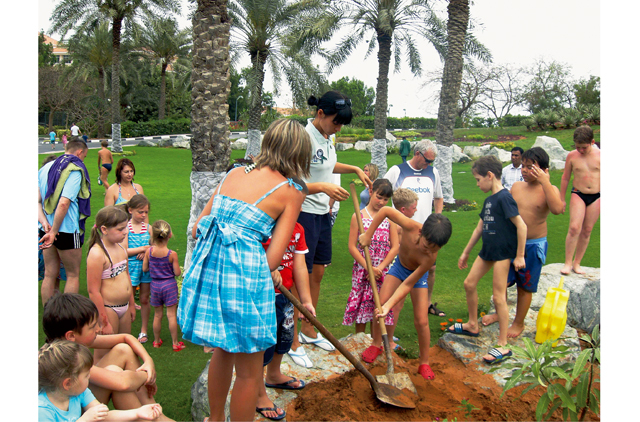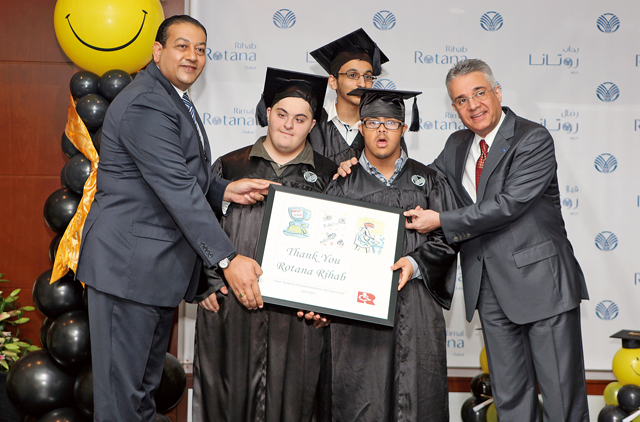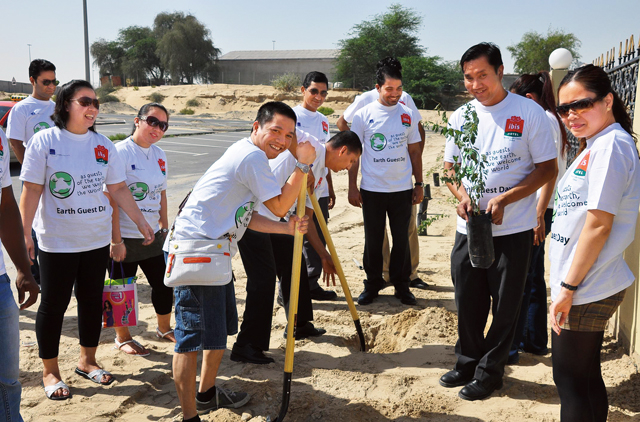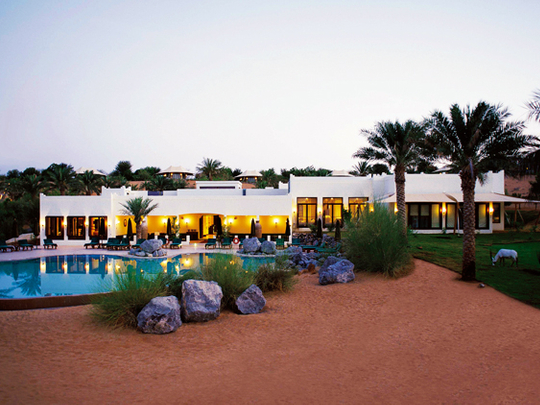
When you check into a high-end hotel, you expect the bed sheets to be crisp and white, the towels fresh and replaced every day, lights aplenty and hot and cold water to be available at all times.
What many guests don’t realise is that while all these things help to make their stay a pleasurable experience, they all increase the carbon footprint enormously. But now several hotels have woken up to this issue and are determined to address it.
Keen to end – or at least greatly reduce – the waste and destruction of natural resources, a growing proportion of the hospitality industry is adopting what it calls sustainable hospitality measures, and is looking for new and innovative ways to keep the earth green.
From protecting the natural environment, preserving culture and heritage and recycling junk, to using energy-efficient labour-saving devices, composting biodegradable waste and growing their own organic vegetables, hotels around the world are exploring different ways of reducing their carbon footprint.
Friday checked out five hotels in the UAE that are going out of their way to introduce sustainable hospitality strategies that are making a positive difference.
Who: Al Maha Desert Resort and Wildlife Reserve, Dubai
What: Protecting the environment and preserving heritage and culture.
How: One of the few hotels where conservation began with the structure and design, the Al Maha Desert Resort and Wildlife Reserve in Dubai has several ongoing programmes to conserve wildlife and preserve natural heritage.
Preservation of natural desert habitat is integral to its architecture. Its green design has been internationally acknowledged, as it received the World Legacy Award from National Geographic, and the Arab Cities Award for Architecture and for Best Environmental Design, among many others.
The architecture of the resort is a clear deviation from the typical skyline of the UAE. Al Maha’s desert conservation project, covering 225 square kilometres, is based on ‘global norms’ and works with the aim of protecting Dubai’s last remaining desert habitats.
It is the largest area under protected management in the Gulf; propagating around 6,000 indigenous trees and shrubs, the Reserve operates as a national park and is a haven for several rare mammals and birds.
A wide range of indigenous species, several of them threatened, such as the Arabian oryx and gazelles that were bred by the project, were released into the area and have been coexisting peacefully ever since. Priceless Arabian antiques conserve the local heritage.
The Al Maha collection contains more than 2,000 original items of jewellery, weaponry, artwork, antiques, household items, furniture and handicrafts. The collection ensures that such rare pieces stay in the region, and are not lost by being sold and exported to collectors overseas.
Tourists get the chance to experience the flavours of true Bedouin life, with heritage activities such as falconry demonstrations, camel safaris, horse riding over the sand dunes, archery with traditional wooden bows and nature walks. From conception to design, this desert resort is a champion of conservation causes that promotes national heritage.
Who: Ramada Hotel and Suites Ajman
What: Reducing hotel waste.
How: The hotel launched a programme to reduce its waste from 100kg a day to zero, within in a year.
It was a tall order, but Iftikhar Hamdani, general manager of Ramada Hotel and Suites Ajman and his team, were up to the challenge. “Before we began, we found that the total waste generated at the hotel every year was 360 tonnes. With our efforts in recycling, cutting down on food wastage and composting biodegradable waste, we have succeeded in saving nearly 328 tonnes of waste from going to the landfill. That’s a 90 per cent reduction this year, which I think is a great achievement.
“We want to achieve zero waste to landfill, but it is fact that we can’t recycle and re-use every kind of waste through our compost machine. Some materials, including plastic, paper, glass, used oil, metal and ink cartridges, can be recycled, but some waste from the guest rooms is not recyclable or reusable at the moment.
“We are working on this project with Green Mountains Waste Management to reduce our waste even further by another 5 to 6 per cent. It is always good to start an initiative, and it will be improved with further development as the project progresses.”
The hotel has also achieved remarkable success in recycling water. Its daily water requirement is 45,000 to 50,000 gallons. It installed an RO (reverse osmosis) plant at its premises to purify hard water so it could be used.
“Thanks to the RO plant, we were able to save the wear and tear on our laundry and kitchen equipment, which hard water would usually cause. We know that the change worked because no more breakages were reported after the improvement in water quality. Also, we don’t have to purchase any water anymore – instead we use water drawn from borewells and filter it on site.”
Iftikhar is continuing the education of the guests and staff, and is very optimistic about reaching more green milestones. “Green is not a colour, it is a state of mind, and we need to give back to society and spare our time, as it’s for a great cause,” he says.
Who: Hotel Le Méridien Al Aqah, Fujairah
What: Environmental clean-up and protection drives.
How: Over the past five years, Le Méridien Al Aqah has launched several projects aimed at cleaning up the environment and reducing its carbon footprint. The schemes promoted by the hotel, including the reef ball programme and sea turtle conservation programme, have been extremely successful.
In 2009, the resort joined up with Al Boom, the team responsible for operating its on-site dive centre, to create an artificial coral reef. The project included the placement of 18 reef structures and reef balls approximately 500 metres off the resort’s shoreline.
Reef balls are hollow, moulded blocks of concrete that provide shelter for plants and coral to grow.
There is evidence that the increased amount of healthy coral has attracted fish and other marine life such as whale sharks and stingrays to the region. And there is also evidence that the conservation programme for sea turtles that the hotel undertook has helped save the lives and promote the healthy growth of the creatures in the waters off the Oman coast.
Patrick Antaki, general manager of the hotel, is a big believer in recycling as well as preserving wildlife. “Recycling is also a top priority at the hotel,’’ he says. “Recycled grey water is used to water the gardens and lawns, and everything from cans, bottles, ink cartridges and scrap metal to bathroom amenities and paper is collected, separated and sent to a local recycling plant. We’ve also introduced low-flow toilets and water-saving showers to save precious water while still doing the job.’’
In hotel kitchens, electrical appliances are being used more efficiently and for less time. Also, shorter dishwasher cycles are being used to wash crockery. The installation of energy-efficient fluorescent lighting in back-of-house areas and motion sensors in low-occupancy storage areas has also helped reduce energy wastage.
Who: The Rotana Group of hotels
What: Giving back to the community
How: The Rotana Group of hotels has been involved in providing vocational training for students with special needs since 2009. Faaten Mohammad, spokesperson for the group, says, “Each year the group selects three students for each of its three flagships, Rimal, Rihab and Villa Rotana, from the Rashid Paediatric Centre.
“The students are trained in jobs such as towel folding, arranging plates and data-entry operations among other things. The training is provided for six to eight months, and is followed by a ceremony, where the students are awarded certificates. A few students from our previous programmes are now part of our staff. The training not only helps them blend with people, it also improves their self-esteem and prepares them for future jobs,” says Faaten.
Bushra, the mother of special needs teenager Mohammad Yahya, was thrilled to discover that her son had a good chance of landing a job with the group. Mohammad, 18, was selected for the vocational training programme at Rihab Rotana Hotel in Deira. “Work experience has affected Mohammad positively,” says Bushra. “It has lifted his spirit and improved his personality – especially his social communication. It was a very nice experience and we really appreciate the chance that he’s been given.”
Who: The Accor Group of hotels
What: Planet 21 programme.
How: The programme focuses on sustainable development and involves hotel employees and guests worldwide. Referring to Agenda 21, the action plan adopted by 178 heads of state at the 1992 Earth Summit in Rio de Janeiro, it underscores the urgent need to change our production and consumption patterns to protect our planet.
Planet 21 promotes responsible eating, reducing water and electricity use, increasing use of renewable energy and using sustainable buildings. The group initiated an Earth Guest programme in 2006 in all its hotels, where employees and guests were encouraged to plant trees around the grounds of its hotels.
Christophe Landais, group managing director of Accor Middle East, says, “We also tied up with the eco-friendly website Goumbook in the UAE, and participated in its Give a ghaf tree programme, planting nearly 120 trees on April 21 at the Arab Unity school. We plan to do even more to be green in the community.
“Our organisation is the only hotel group to be rated by the Dow Jones sustainability Index,” says Christophe. Companies are selected for the Index based on a comprehensive assessment of long-term economic, environmental and social criteria that account for general as well as industry-specific sustainability trends. The Accor group has been involved with the local communities, promoting fair trade.
It has also been successful in reducing energy consumption. “We have managed to reduce energy use by 5.5 per cent worldwide [over the past year], and 82 per cent of Accor hotels are equipped with compact fluorescent lamps for areas that have to stay lit at all times. Also, more than 110 hotels have been fitted with solar panels.”
The chain has also reduced water consumption in the UAE by 12 per cent. The group has been undertaking sustainable activities such as recycling, to cut down on the amount of waste that goes into landfills. And it has also started to source more of its food produce from local vendors.


